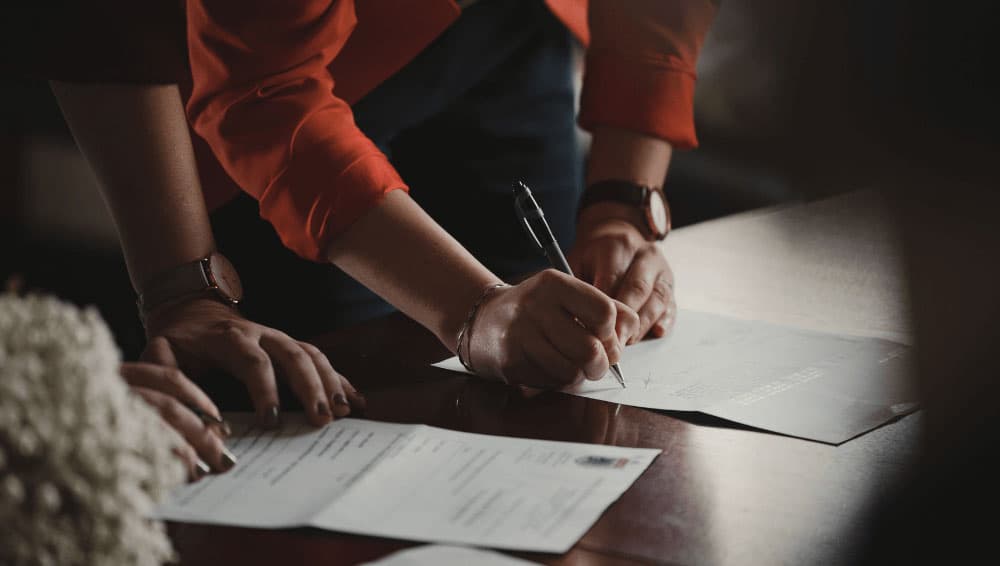What can I do if someone forged my signature?

Published:
If you’re asking yourself; “what can I do if someone forged my signature?”, then chances are, you suspect this might have happened to you.
If you have found yourself in a situation where someone has forged your signature, it’s essential to take immediate action to protect your rights and financial well-being.
In this guide, we’ll explore the steps you should take if your signature has been forged, and delve into some of the ways you can minimise the risk of signature forgery in the future.
What does forged mean?
The word “forged” means to make a fake or imitation of something, usually with the intent to deceive or trick others into thinking it’s genuine.
Forging a signature is the unlawful act of imitating another person’s signature on a document. This type of forgery can occur in various situations, such as contracts, legal agreements, financial transactions, and even personal documents like wills and cheques.
Is it illegal to forge a signature in the UK?
In short, yes! There are only certain circumstances where an individual may sign a document on behalf of someone else. Forging a signature in all other circumstances is a criminal offence and can result in legal consequences such as:
- Criminal charges: Forging a signature is illegal and can result in criminal charges, leading to fines or even jail time.
- Invalid agreements: Any document with a forged signature may be deemed invalid, affecting the rights and obligations of the parties involved.
How do I know if my signature has been forged?
Detecting forged signatures can be challenging, as forgers often use sophisticated techniques. However, there are certain signs to look for that may indicate a forged signature:
- Inconsistencies in the signature: A forged signature may not match your usual handwriting, including variations in size, slant, or style.
- Unusual tremors or shaking: A forger may have difficulty replicating natural hand movements, resulting in shaky lines.
- Ink irregularities: Pay attention to the type of ink used; forged signatures may exhibit variations in ink colour or thickness.
- Lack of fluidity: Natural signatures tend to flow smoothly, while forgeries may appear disjointed.
What to do if your signature is forged
If you suspect that someone has forged your signature, it’s essential to take prompt and decisive action. Here are the steps you should consider:
1. Contact the party who received the fraudulent signature
The first step is to report the forged signature to the recipient of the fraudulent document or agreement. This way they can stop any further potentially damaging actions that may occur.
2. Seek legal advice
Seek the guidance of a lawyer with expertise in forgery cases. Although this is an expensive clean-up operation, they are best positioned to help you navigate the legal process and protect your rights.
3. Gather evidence
Collect any documents related to the forgery and maintain a record of any communication pertaining to the signature.
4. Protect your finances
If the forgery involves financial transactions, it’s sensible to notify your bank or financial institutions of your situation. They can help you take appropriate measures to safeguard your accounts.
Can I sue someone for forging my signature?
Signature forgery is illegal and considered a criminal offence. If someone forges your signature, you have the legal right to take the person responsible to court to seek justice and potential compensation for any damages or losses you may have suffered as a result of the forgery.
To be successful, you need proof that your signature was forged and so it’s advisable to consult with a legal professional to guide you through the process and help you build a strong case.
How do I protect my signature against forgery?
Electronic signatures, or eSignatures can significantly reduce the risk of signature forgery due to their enhanced security and traceability compared with traditional wet signatures.
Unlike paper documents, electronically signed agreements are stored digitally and contain a thorough audit trail, making them significantly more difficult for someone to tamper with.
Here are some of the benefits of using eSignatures:
1. Enhanced security
eSignature software often comes with advanced security features, like password protection or multi-factor authentication, making it difficult for forgers to replicate electronic signatures.
2. Document integrity
Advanced and Qualified digital signatures are encrypted to be “tamper-proof”, ensuring that the signed document remains unchanged.
3. Time and cost efficiency
eSignatures streamline the signing process, eliminating the need for physical paperwork and reducing administrative costs.
4. Environmental Sustainability
By reducing the need for paper, eSignatures contribute to a more eco-friendly approach to documentation.
5. Legal validity
In many parts of the world, eSignatures have legal recognition, making them a valid and accepted means of signing documents.
Forging signatures is a serious offence with legal consequences. If you suspect that someone has forged your signature, it’s crucial to take immediate action. Additionally, consider the adoption of eSignatures in your personal and professional life to enhance document security and reduce the risk of forgery.
Stay Secure with Signable
Concerned about signature forgery or want to protect your documents? Sign up for a 14-day free trial to enhance your document security and streamline your paperwork!